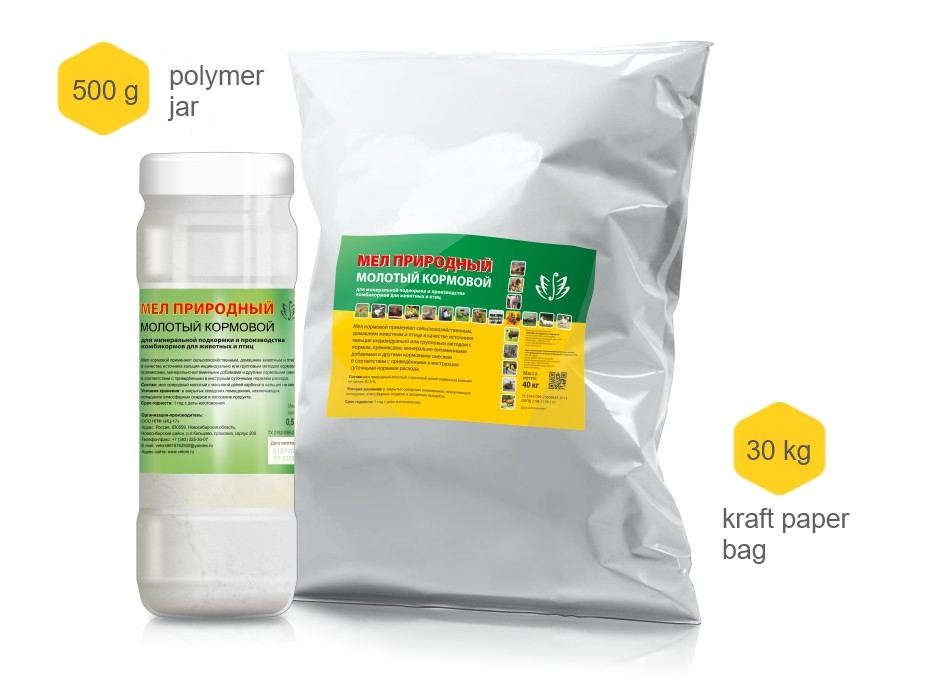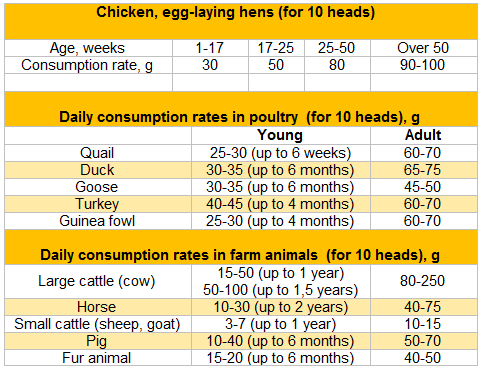FEED CHALK Natural powdered

Dosage form: powder.
Presentation: 500 g polymer jar; 30 kg kraft paper bag.
Identification: Feed chalk is powder or grits of white to light-grey or cream colour, odorless, insoluble in water, without extraneous impurity.
Composition: Feed chalk contains 97,5% calcium carbonate made by gridding natural chalk.
Indications: Feed chalk is used for mineral feeding and manufacturing mixed feed as a source of calcium.
Pharmacological properties: Feed chalk is a main resource of calcium in feeding animals and poultry. Calcium stimulates the function of cardiovascular system, influences on blood clotting ability, and provides osmotic pressure constancy. It takes part in nerve transmission, in initiating muscular contraction owing to actin-myosin complex; calcium with insulin activates transporting glucose into cells. Calcium forms bone tissue, supports muscle tone, prevents advanced development of osteoporosis and osteohalisteresis, provides correct formation of muscular and skeletal system in young animals and birds. Calcium is a part of different enzyme systems, catalyzing biochemical reactions in the body, besides it increases nonspecific host resistance. Ions of calcium take part in passing nervous impulses and in activity in skeletal and unstriated muscles. The intercellular bone substance is rich in calcium salts, calcium with proteins (mainly collagen-ossein) provides hardness and elasticity of bones. Calcium has a beneficial effect on iron metabolism in the body of animals and birds, and it removes toxins.
When using feed chalk as a source of calcium, the average daily weight gain of muscle mass increases in productive animals, the yield of meat, milk and eggs are increased, the quality and dietary properties of the products are improved. Chalk consumption is strictly oriented to the body - calcium need depending on health status, present pathological processes and age in animals and poultry.
When administered orally, the mineral components of the supplement are quickly absorbed and mainly excreted with urine from the body. When feeding chalk, it is necessary to take into account the ratio between calcium and phosphorus (1.2-2 : 1) entering the body.
Administration and dosage: For oral use.
Feed chalk is given to animals individually or in a group with feeds, premixture, mineral and vitamin supplements and other combined feed according to the following:
Contraindications: Higher individual intolerance to the components.
Side effects: In applying the feed chalk according to the instruction, side effects and complications are not observed.
Note: There are not any sale restrictions for meat and meat products after using feed chalk.
Personal safety precautions: In case of accidental contact with skin or eyes it is recommended to wash them with a great amount of water.
If an animal swallows a great number of feed chalk, make the animals drink some liters of water.
Storage conditions: Feed chalk is transported and stored in a dry place.
Shelf life: 1 year after the date of manufacture and under keeping storage and transportation conditions. Do not use after the expiry date.
Keep out of the reach of children and animals.
Presentation: 500 g polymer jar; 30 kg kraft paper bag.
Identification: Feed chalk is powder or grits of white to light-grey or cream colour, odorless, insoluble in water, without extraneous impurity.
Composition: Feed chalk contains 97,5% calcium carbonate made by gridding natural chalk.
Indications: Feed chalk is used for mineral feeding and manufacturing mixed feed as a source of calcium.
Pharmacological properties: Feed chalk is a main resource of calcium in feeding animals and poultry. Calcium stimulates the function of cardiovascular system, influences on blood clotting ability, and provides osmotic pressure constancy. It takes part in nerve transmission, in initiating muscular contraction owing to actin-myosin complex; calcium with insulin activates transporting glucose into cells. Calcium forms bone tissue, supports muscle tone, prevents advanced development of osteoporosis and osteohalisteresis, provides correct formation of muscular and skeletal system in young animals and birds. Calcium is a part of different enzyme systems, catalyzing biochemical reactions in the body, besides it increases nonspecific host resistance. Ions of calcium take part in passing nervous impulses and in activity in skeletal and unstriated muscles. The intercellular bone substance is rich in calcium salts, calcium with proteins (mainly collagen-ossein) provides hardness and elasticity of bones. Calcium has a beneficial effect on iron metabolism in the body of animals and birds, and it removes toxins.
When using feed chalk as a source of calcium, the average daily weight gain of muscle mass increases in productive animals, the yield of meat, milk and eggs are increased, the quality and dietary properties of the products are improved. Chalk consumption is strictly oriented to the body - calcium need depending on health status, present pathological processes and age in animals and poultry.
When administered orally, the mineral components of the supplement are quickly absorbed and mainly excreted with urine from the body. When feeding chalk, it is necessary to take into account the ratio between calcium and phosphorus (1.2-2 : 1) entering the body.
Administration and dosage: For oral use.
Feed chalk is given to animals individually or in a group with feeds, premixture, mineral and vitamin supplements and other combined feed according to the following:
Table. Daily consumption rate

Contraindications: Higher individual intolerance to the components.
Side effects: In applying the feed chalk according to the instruction, side effects and complications are not observed.
Note: There are not any sale restrictions for meat and meat products after using feed chalk.
Personal safety precautions: In case of accidental contact with skin or eyes it is recommended to wash them with a great amount of water.
If an animal swallows a great number of feed chalk, make the animals drink some liters of water.
Storage conditions: Feed chalk is transported and stored in a dry place.
Shelf life: 1 year after the date of manufacture and under keeping storage and transportation conditions. Do not use after the expiry date.
Keep out of the reach of children and animals.



 Other products for animals
Other products for animals